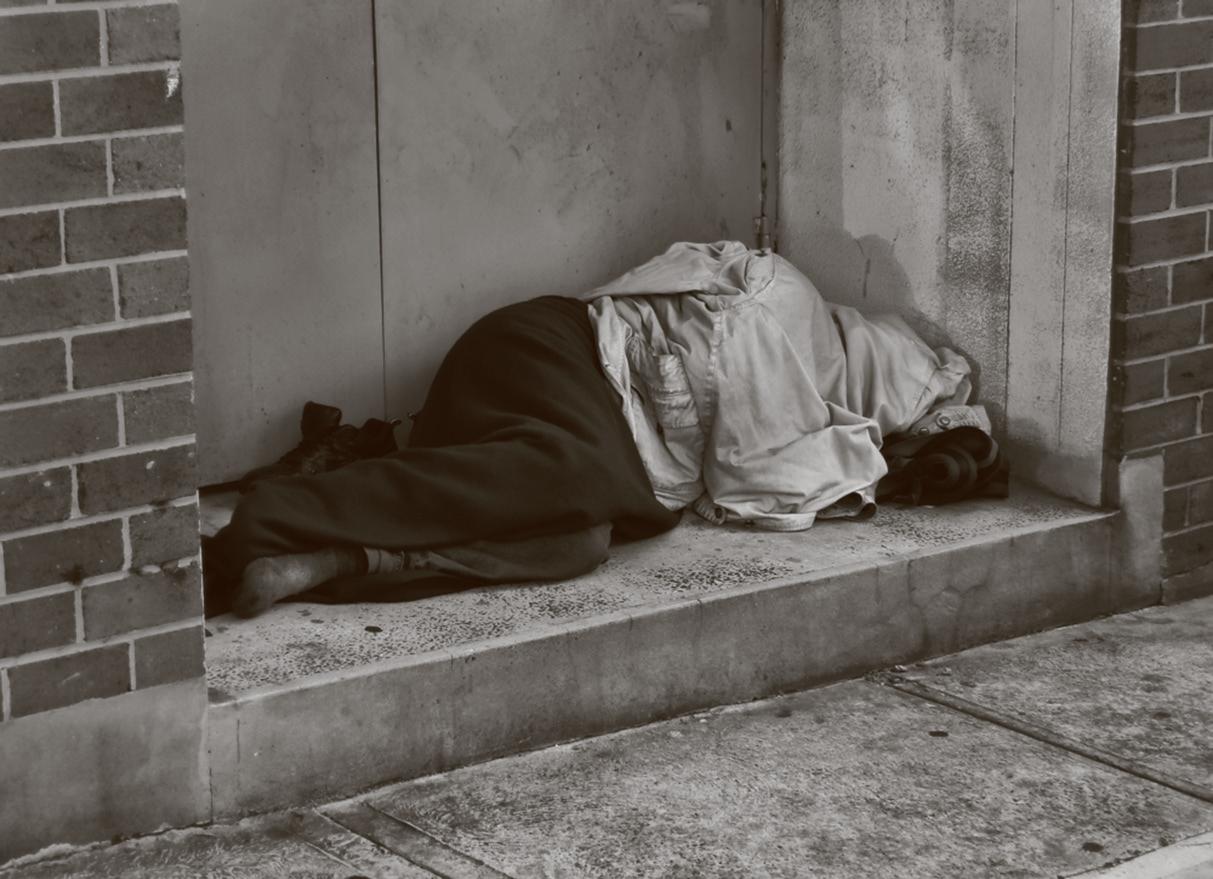Community
Homelessness: Gap between perception and reality

ALMOST half of online adults aged 18+ in Wales (46 per cent) say they always, or almost always do nothing when they see someone in the street who is  homeless, compared to 54 per cent across the UK. More than a quarter of people in Wales say the main cause of homelessness is alcohol or drug addiction (30 per cent), followed by debt (20 per cent), according to new research commissioned by The Salvation Army.
homeless, compared to 54 per cent across the UK. More than a quarter of people in Wales say the main cause of homelessness is alcohol or drug addiction (30 per cent), followed by debt (20 per cent), according to new research commissioned by The Salvation Army.
The Salvation Army also carried out a survey of more than 300 residents of its centres (Lifehouses) for people experiencing homelessness, including Swan Lodge in Sunderland, and reveals a worrying gap between the reality of what it’s like to be homeless and the perception of the general public.
The Church and charity is warning that without greater education this gap will widen, making it harder for people who are experiencing homelessness to get their lives back on track which could risk increasing the cost to society in the future.
Major Howard Russell, Deputy Territorial Director of Homelessness Services at The Salvation Army, said: “At The Salvation Army we are working to end the cycle of homelessness and one of the key hurdles we face is around people’s attitudes as our research has revealed the general public believe alcohol and drugs are the root cause of homelessness when, in our experience, this isn’t the case. We believe educating the public on the reality of what causes homelessness is the way to overcome this.”
The Church and charity’s survey of its Lifehouses, reveals the main cause of homelessness is relationship breakdown (43 per cent), followed by a combination of issues (16 per cent), physical or mental health problems (13 per cent), job loss (11 per cent), then addiction (10 per cent), and finally debt (6 per cent).
Major Russell said: “While the general public appear to be aware that there are a variety of causes of homelessness, more than a quarter of people incorrectly perceive drug and alcohol addiction to be the main cause.
“Yes, alcohol and drugs may be a problem for many people experiencing homeless, this often comes as a result of homelessness and, as our survey of our Lifehouse residents shows, it is rarely the cause. Instead, it is relationship breakdown, something that can happen to anyone at any time.”
While revealing that 73 per cent of those in Wales say that at least some of the time they do nothing when they see someone who is experiencing homelessness, 41 per cent say they give cash at least sometimes, 26 per cent sometimes purchased something to eat or drink and 15 per cent say that they at least sometimes find out where the nearest homelessness service is and pass on the details to the person who was sleeping rough.
Major Russell continued: “We find it quite shocking that such a large proportion of the public polled would simply walk on by, doing nothing for a person sleeping rough.
“It isn’t an issue that can be ignored and we believe awareness needs to be raised. Our extensive experience has shown us that homelessness can affect anyone, and so it is surprising that the Ipsos MORI poll has revealed 36 per cent of people in Wales don’t think that they, or someone close to them could ever experience homelessness. At our Lifehouses you’ll find many people who previously worked in a range of professions and skilled jobs.”
The Church and charity’s survey of Lifehouses reported that 89 per cent of residents agreed that if there was one thing they wished they’d known before they experienced homelessness it was that it can happen to anyone.
The Salvation Army believe the Ipsos MORI research reveals a lack of understanding around who can be affected by homelessness as 21 per of people say it is not at all likely that someone with a job that requires a professional qualification could ever become homeless.
Interestingly the survey of Salvation Army Lifehouse residents shows that 72 per cent worked before they experienced homelessness. In addition, 65 per cent reported that employers treat them differently when they find out they’re homeless. For 70 per cent people in general treat them differently because they are experiencing homelessness.
Damon Short is a resident at Ty Gobaith Lifehouse in Cardiff. He lived on the streets for over 30 years after being in care, approved schools, hostels and jail.
He was approached by an outreach worker of the Bridge Programme at The Salvation Army and slowly began to rebuild his life. He is now a volunteer on the church and charity’s Bus Project for rough sleepers and credits The Salvation Army with helping turn his life around.
He said: “My early experiences in life made me institutionalised but I liked being on the streets because I was meeting new people and there was always something new to do etc. So my life (existence) was centred on drink and drugs resulting in me having no food – this was my situation for a long, long time.
“My Mother moved to Cardiff and I started to help her as she was alcohol and hash dependant. It made things easier for me to see her but to be honest this also made things harder for me as my health was getting worse daily.
“During one of my admissions to hospital for my drinking I was approached by the outreach worker of the Bridge Programme at The Salvation Army. A place was made available and even though I was unsure about what it was or what I could do there I accepted it. During the early days of being there a few of my friends passed away and I found the programme hard to say the least. I eventually got my detox date in the local hospital – this really scared me and I wondered what would be left in life or how I would feel without drink or drugs in my life.
“I completed my detox – I was chuffed, I’d actually done it. It felt all new and weird at first, I wasn’t too sure if I liked it or not. After a few weeks my Mother had become more and more withdrawn, her moods had changed which sadly resulted in her taking her own life. I was devastated! I attended the cremation but didn’t want to attend the wake as I knew it could start me back drinking and if I started drinking over this sadness I wouldn’t come out the other side whole.
“This actually made me stronger and gave me such determination to stay dry and clean. Initially I thought the Bridge Programme wasn’t what I wanted – how wrong was I! After a little time I started with help to deal with my feelings and thoughts, it was then that I started to live rather than exist!
The daily group sessions became exciting and I engaged fully in them, this boosted my confidence and self belief. I started to volunteer at a Peer Mentoring Group after passing the appropriate courses arranged by the Skills department. My courses have given me options to eventually achieve a NVQ via OCNs and Learn Direct.
“Recently I have regained contact with my children after seven years which is brilliant. I also volunteer on The Salvation Army’s Outreach Bus Project with the rough sleepers of Cardiff – I enjoy this immensely as I relate fully. It will only be a matter of time before I also start to assist at the local needle exchange project.
“All these placements and meetings are so worthwhile as now I’ve a purpose to get up in the mornings; my confidence and independence is such that I can’t wait for my own property to become available.
I would never have thought that I would ever be where I am today; it just proves how far I’ve come with the help and assistance of everyone who has invested their time and effort into my recovery. I am the man I am today because people believed in me and I started to believe in myself – I am now a happy, excited and purposeful person.”
The survey of Lifehouse residents reveals 68 per cent feel that people see their homelessness rather than them as a person.
The Ipsos MORI survey of online adults in the UK goes further in revealing the challenges faced by people once they have secured somewhere permanent to live and got their lives back on track, as 58 per cent agree that employers are less likely to give jobs to people who have previously experienced homelessness.
Major Russell concluded: “The MORI poll result appears to suggest that people believe once you’ve experienced homelessness employers will think twice about giving you a job. At The Salvation Army we never give up on anyone as we believe in helping individuals to reach their full potential, whatever that may be, and we would like to encourage people to put themselves in the shoes of a someone experiencing homelessness, as it is something that can happen to anyone, it’s not just alcoholics and drug addicts.”
The Salvation Army is an expert in running services for people experiencing homelessness and understands that a tailored and personal approach is needed when providing support. The Church and charity is keen to demonstrate that it’s not a simple case of providing accommodation as it employs a skilled workforce who are there at every step of the way to walk alongside residents and equip them with the skills and support they need to reach their full potential, whether that be employment, re-connecting with family or beating an addiction.
In total The Salvation Army have more than 80 homelessness services around the UK and the Republic of Ireland. It runs a number of courses and activities at all it’s Lifehouses which range from employment skills and cookery classes to how to keep their tenancy when they get somewhere to live, an important part of breaking the cycle of homelessness.
According to The Salvation Army’s survey, 76 per cent of residents take part in at least one activity on offer and 32 per cent do all the courses available to them, which the Church and charity believe shows how keen residents are to get their lives on track, if society will allow them the opportunity.
This year The Salvation Army is celebrating 150 years of transforming lives and it is still at the heart of every community today, supporting those in need.
If a member of the public sees someone rough sleeping The Salvation Army would like to suggest the public visit their local council’s website for 24 hour assistance on what they can do to help someone who is sleeping rough or experiencing homelessness.
Community
Cresswell Quay conservation consultation launch backed

A PUBLIC consultation is to be held on potentially making one of south Pembrokeshire’s most scenic estuarial villages, home to a CAMRA award-winning pub, a conservation area.
At the July 24 meeting of Pembrokeshire Coast National Park, members backed a public consultation being launched for potentially designating Cresswell Quay as a Conservation Area.
Cresswell Quay, home to the Cresselly Arms, is “one of the most scenic villages within the National Park and is highly significant as a very early coal port, retaining several buildings of architectural importance,” a report for members stated.
There are some 500 conservation areas, defined as “areas of special architectural or historic interest, the character of which it is desirable to preserve or enhance” across Wales, 14 in the national park.
The report for Park members added: “The designation of a conservation area at Cresswell Quay would recognise the special architectural and historic interest of the village and would ensure that future development either preserves or enhances the character and appearance of the conservation area.
“The designation would introduce controls over the demolition of buildings which would require conservation area consent and affords greater protection of works to trees. Officers consider that part of the special interest of Cresswell Quay is the relationship between the village, the estuary and its wooded setting, which is unusual in a Pembrokeshire context.”
The consultation on the conservation status has been backed, rather than simply be designated in-house as Cresswell Quay is the home of the Buildings Conservation Officer; the consultation being launched “to avoid any potential conflict of interest or wider public misconception”.
It will be undertaken by Linda Jones of Babb Architects, Whitland and Emily Holder, Conservation Assistant, supported by members of the Strategic Policy team.
Initial engagement with key landowners and the three community councils of the area has already taken place, and a public drop-in event is expected to take place in early August.
Further information on the consultation will also promoted at events including the Pembrokeshire County Show and Martletwy Show.
At the national park meeting, member Cllr Simon Hancock expressed his surprise the ‘Quay was not already in a conservation area.
The eight-week consultation is expected to be launched on July 29, finishing on September 23.
Earlier this year the Cresselly Arms won the CAMRA (Campaign for Real Ale) pub of the year award for the whole of Wales.
The Cresselly Arms averaged 89 points out of a maximum 120 after surveys were conducted across the country by members of other branches.
Community
Public reminded to stay away from Ward’s Yard and Criterion Quay

THE PORT of Milford Haven is reminding members of the public to stay away from Ward’s Yard in Milford Haven and Criterion Quay (sometimes known as the offshore jetty) in Pembroke Dock due to concerns over public safety.
Despite significant security measures, people continue to access the sites illegally, ignoring and sometimes damaging the onsite signage and fences.
Niall Yeomans, Head of Health, Safety and Security at the Port of Milford Haven said: “Safety is our key priority. Members of the public are continuously putting themselves and members of our team at risk of serious harm by trespassing in these areas.”
“Both Ward’s Yard and Criterion Quay are unsafe for public access. They are isolated areas next to deep water and are susceptible to slips, trips and falls.”
Both sites are owned by the Port of Milford Haven and are private property. Anyone found onsite without consent is trespassing, and any criminal damage could result in prosecution.
Anyone who sees any suspicious activity at Ward’s Yard or Criterion Quay is asked to contact Dyfed Powys Police on 101 urgently.
Community
Port sponsors water safety programme for Pembrokeshire pupils

OVER 200 children from coastal schools in Pembrokeshire have learnt important water safety skills in a project sponsored by the Port of Milford Haven.
Dale-based water sports provider, Windswept CIC, has been running the Swim Safe programme for Year 5 and 6 pupils from St Francis Catholic Primary School, Milford Haven Community Primary School, Neyland Community School, Broad Haven Primary School and Cleddau Reach School over the past few months. Swim Safe was started by the RNLI and Swim England and consists of a teacher-led school session with materials and lesson plans provided, followed by a beach session covering a wide range of topics including what to do in an emergency situation, survival techniques and recognising risks associated with water.
Director of Windswept, Sarah Bagley, said “This is our second season conducting Swim Safe training to schools in Pembrokeshire, supported by the Port of Milford Haven. Swim Safe is such a great initiative and is so important for all young children to equip them with life saving skills prior to the summer holidays. We’d like to thank the Port of Milford Haven once again for supporting this great cause!”
Sara Richards, PR and Communications Executive at the Port of Milford Haven, attended a session with Cleddau Reach School from Llangwm and commented “Living near the sea means it’s vital that young people know what to do in an emergency and are aware of the risks associated with the water. We want everyone to enjoy the coastline as much as possible this summer armed with the safety tips that they will have learnt with Windswept.”
-

 Education5 days ago
Education5 days agoMilford Tesco worker achieves Oxford dream and lands top legal job
-

 Crime4 days ago
Crime4 days agoHaverfordwest man admits having nearly 1000 child and animal images
-

 Crime4 days ago
Crime4 days agoYouth set to appear in court over serious sexual offences
-

 Crime4 days ago
Crime4 days agoPolice investigating after man injured during altercation in cemetery
-

 Education4 days ago
Education4 days agoPupils delight in ice cream treat from Pembrokeshire’s number one van
-

 Crime4 days ago
Crime4 days agoTown centre ‘stinking of skunk’ as police strip cannabis farm
-

 Crime3 days ago
Crime3 days agoFag-butt police court summonses spark debate in Pembrokeshire
-

 News6 days ago
News6 days agoProposal to give firefighters a council tax discount to go to Cabinet




























